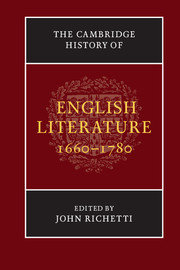Book contents
- Frontmatter
- Introduction
- PART I LITERARY PRODUCTION AND DISSEMINATION: CHANGING AUDIENCES AND EMERGING MEDIA
- PART II LITERARY GENRES: ADAPTATION AND REFORMATION
- PART III LITERATURE AND INTELLECTUAL LIFE: THE PRODUCTION AND TRANSMISSION OF CULTURE
- 14 History and literature 1660–1780
- 15 A preliminary discourse on philosophy and literature
- 16 Britain and European literature and thought
- 17 Religion and literature
- 18 Literary criticism and the rise of national literary history
- 19 Augustan England and British America
- PART IV LITERATURE AND SOCIAL AND INSTITUTIONAL CHANGE
- PART V LITERARY GENRES: TRANSFORMATION AND NEW FORMS OF EXPRESSIVENESS
- PART VI CONCLUSION
- Chronology
- Bibliographies
- Index
- References
14 - History and literature 1660–1780
from PART III - LITERATURE AND INTELLECTUAL LIFE: THE PRODUCTION AND TRANSMISSION OF CULTURE
Published online by Cambridge University Press: 28 March 2008
- Frontmatter
- Introduction
- PART I LITERARY PRODUCTION AND DISSEMINATION: CHANGING AUDIENCES AND EMERGING MEDIA
- PART II LITERARY GENRES: ADAPTATION AND REFORMATION
- PART III LITERATURE AND INTELLECTUAL LIFE: THE PRODUCTION AND TRANSMISSION OF CULTURE
- 14 History and literature 1660–1780
- 15 A preliminary discourse on philosophy and literature
- 16 Britain and European literature and thought
- 17 Religion and literature
- 18 Literary criticism and the rise of national literary history
- 19 Augustan England and British America
- PART IV LITERATURE AND SOCIAL AND INSTITUTIONAL CHANGE
- PART V LITERARY GENRES: TRANSFORMATION AND NEW FORMS OF EXPRESSIVENESS
- PART VI CONCLUSION
- Chronology
- Bibliographies
- Index
- References
Summary
The histories published between 1660 and 1780 include some of the most compelling and dazzling narrative performances in British literature. Historical writing occupied a central place in British culture throughout this period, and its prestige was, if anything, enhanced rather than diminished by its unprecedented commercial success. By the later part of the century, the genre (or, it might more accurately be said, family of genres) of history was widely recommended to readers of all ages and both sexes as a source of political instruction, moral insight, social awareness and imaginative diversion. History was regarded, without qualification, as a branch of literature. This is not to say that writers or readers of history were unaware of or indifferent to the boundary between fact and fiction; simply that they did not feel that the artistic crafting of narrative was fundamentally at odds with its presentation of historical truth. In respect of its self-assured literariness, its generic stability and its prestige, history stands out, in the late seventeenth and eighteenth centuries, as a peculiarly conservative genre in an era of radical literary experimentation and change. While novels and poems were steadily transformed and reinvented during this period, narrative history underwent a process of consolidation. Dynamic and innovative in its adoption of new subject matters and methodologies, this kind of history remained broadly resistant to formal experimentation. The era of Clarendon, Hume, Robertson, Catharine Macaulay and Gibbon, can thus paradoxically be said to represent an extraordinary expansion of the possibilities of traditional historical genre which was nevertheless at odds with the ‘novelisation’ of many other aspects of British literary culture.
- Type
- Chapter
- Information
- The Cambridge History of English Literature, 1660–1780 , pp. 363 - 390Publisher: Cambridge University PressPrint publication year: 2005

